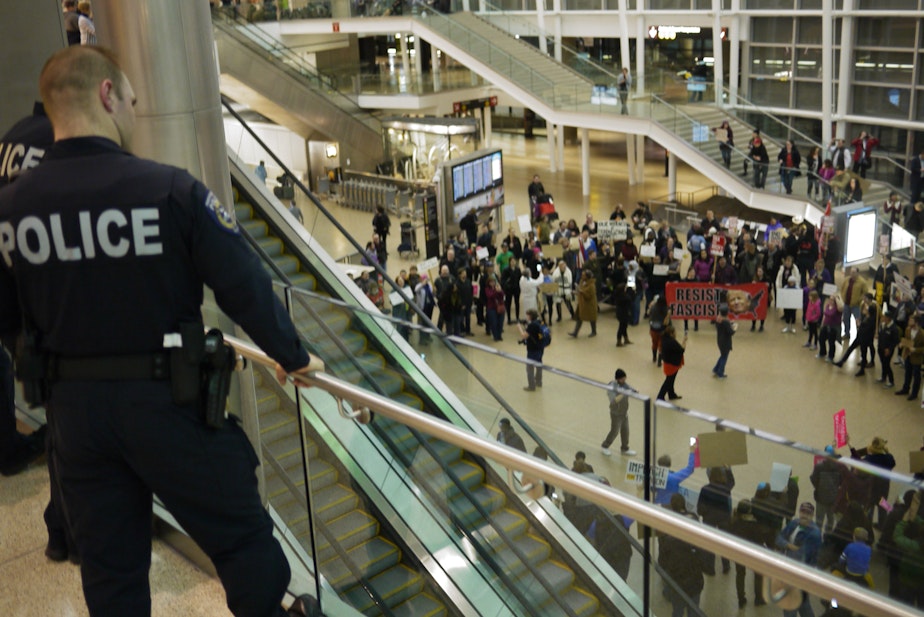The travel ban is back. What to expect at Sea-Tac Airport

A portion of President Trump’s travel ban on six majority Muslim nations is set to be reinstated on Thursday. Much has changed since the initial ban rolled out in late January, leading to a weekend of chaos and protest at Sea-Tac Airport. This time around is likely to be more subdued.
One major difference now is that the U.S. Supreme Court is only allowing the ban to take effect in a limited way. The court will still take up the merits of the case but in the meantime, the temporary ban is more narrow than before.
The court said it doesn’t apply to people with a “bona fide connection” to the U.S., which would include foreigners and refugees with families ties, or people who come on a work or student visa, for example.
Matt Adams, legal director of the Northwest Immigrant Rights Project in Seattle, said this exemption covers a broad swath of people.
“The highest court in the land has clearly affirmed that the Trump administration cannot block people who are coming in on family visas and who have their families members here,” Adams said. “They can’t impede them from being reunited.”
However, visa applicants without a U.S. connection are subject to the ban.
Adams said he’s watching for more detail on how the federal officials will determine who’s eligible.
“Is the Trump administration going to try to play games in defining what these bona fide ties are?” Adams questioned. “In some cases it’s self evident – anyone who has a family visa has a bona fide tie. But what about those individuals on temporary visas? How are they going to draw the line? Is it enough to say they have an aunt or an uncle?"
Adams also expects any visa refusals and subsequent confusion will happen overseas, not at U.S. airports.
The Trump administration has argued the travel pause is necessary to review national security processes and called the high court action a victory.
The first travel ban in January took effect immediately and caught many off guard. This one comes after months of public controversy and litigation.
A Department of Homeland Security statement said the agency will provide additional details on implementation and that it "will be done professionally, with clear and sufficient public notice, particularly to potentially affected travelers, and in coordination with partners in the travel industry."
A Sea-Tac Airport spokesperson said they’re connecting with federal officials and looking into details on the travel policy.
Pro-bono lawyers with Airport Lawyer, an online group that formed during the initial travel ban, has also started to scale up just in case.
“My guess is that we probably don’t see too much activity … for the reason that most folks who were concerned that they might be subject to the ban probably already traveled while the order was stayed by the lower courts,” said Greg McLawson, an immigration lawyer in Tacoma who helped create Airport Lawyer.
Either way, McLawson said volunteer attorneys will be on hand to assist any travelers who may need assistance as the ban takes effect.
The court also allowed the refugee restrictions to take effect, with the same exceptions for people with a U.S. connection. It’s unclear how many refugees admitted to the U.S. already have a family member here, but case workers in Washington state estimate that it’s the majority.
Josh Hornbeck, a spokesman for the Diocese of Olympia refugee resettlement program, said they currently have 100 individual refugees who are in the final vetting stages and awaiting visas to come here.
“Because these refugees have close ties to individuals within the United States, we believe there is a strong possibility they will still be admitted,” Hornbeck said.
But his office is still waiting for clarification from the State Department and remains uncertain about the fate of these clients.
“These refugees are fleeing persecution in their country of origin and we are concerned that they not be turned away at our borders based on confusion or misinterpretation of the court’s ruling,” Hornbeck said.
Additional reporting by Andy Hurst and Ruby de Luna.

